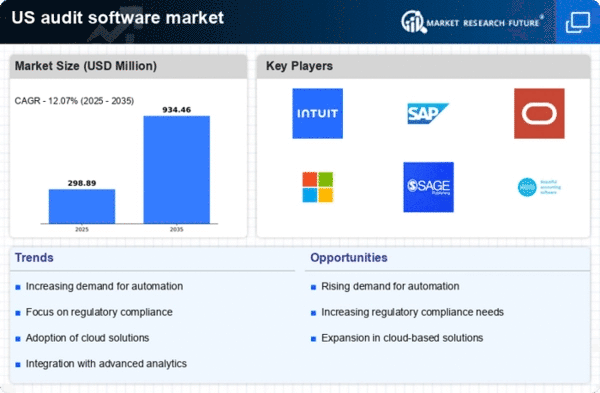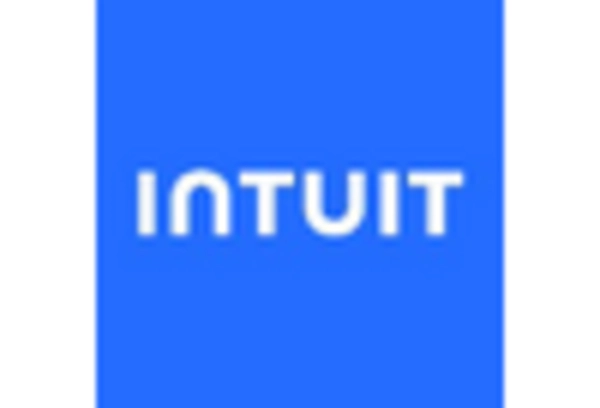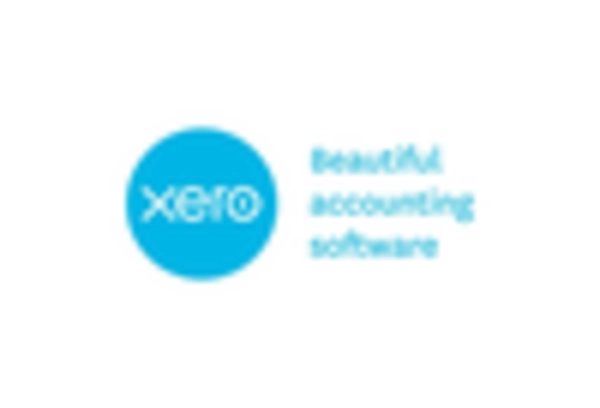Regulatory Compliance Pressure
The audit software market is experiencing heightened pressure from regulatory compliance requirements. Organizations are increasingly mandated to adhere to stringent regulations, such as the Sarbanes-Oxley Act and the Dodd-Frank Act, which necessitate robust auditing processes. This has led to a surge in demand for audit software solutions that can streamline compliance efforts. In 2025, it is estimated that compliance-related expenditures will account for approximately 30% of total audit software market investments. Companies are seeking tools that not only facilitate compliance but also enhance transparency and accountability in financial reporting. As regulatory bodies continue to evolve their standards, the audit software market is likely to expand, driven by the need for organizations to mitigate risks associated with non-compliance.
Increased Focus on Cybersecurity
The audit software market is experiencing an increased focus on cybersecurity measures. As cyber threats become more sophisticated, organizations are prioritizing the protection of sensitive financial data. This has led to a demand for audit software that incorporates robust security features, such as encryption and access controls. In 2025, it is expected that cybersecurity-related functionalities will account for approximately 20% of the total investment in audit software solutions. Companies are seeking tools that not only facilitate audits but also ensure the integrity and confidentiality of financial information. This heightened emphasis on cybersecurity is likely to drive innovation within the audit software market, as vendors develop solutions that address the evolving landscape of cyber threats.
Shift Towards Cloud-Based Solutions
The audit software market is witnessing a notable shift towards cloud-based solutions. Organizations are increasingly adopting cloud technology for its scalability, cost-effectiveness, and ease of access. This transition is particularly relevant in the context of remote work and the need for collaborative auditing processes. In 2025, it is projected that cloud-based audit software will represent over 50% of the total market share. Companies are drawn to the flexibility and efficiency that cloud solutions offer, allowing for real-time collaboration among audit teams. As businesses continue to embrace digital transformation, the audit software market is likely to expand, driven by the growing preference for cloud-based functionalities that enhance operational efficiency.
Growing Demand for Real-Time Reporting
The audit software market is witnessing a growing demand for real-time reporting capabilities. Businesses are increasingly recognizing the value of timely insights into their financial health and operational efficiency. This trend is particularly pronounced in sectors such as finance and healthcare, where rapid decision-making is crucial. In 2025, it is projected that the demand for real-time reporting features will drive a 25% increase in the adoption of advanced audit software solutions. Organizations are seeking tools that can provide instant access to audit trails and financial data, enabling them to respond swiftly to emerging issues. Consequently, the audit software market is evolving to incorporate advanced analytics and visualization tools that facilitate real-time data interpretation.
Integration with Emerging Technologies
The integration of emerging technologies is significantly influencing the audit software market. Technologies such as artificial intelligence (AI), machine learning (ML), and blockchain are being increasingly incorporated into audit solutions. These technologies enhance the efficiency and accuracy of audits by automating repetitive tasks and providing deeper insights into data patterns. In 2025, it is anticipated that the adoption of AI-driven audit software will grow by 40%, as organizations seek to leverage these innovations for improved audit outcomes. The ability to analyze vast amounts of data quickly and accurately positions audit software as a critical component in modern financial management. As businesses continue to embrace digital transformation, the audit software market is likely to expand in response to the demand for technologically advanced solutions.

















